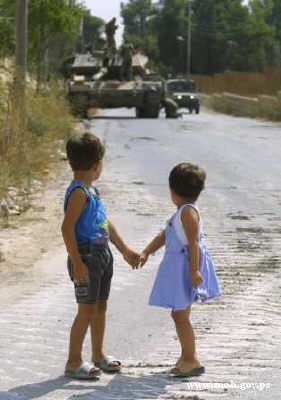The Democratic Revolution in Palestine
Dr. Mustafa Barghouthi
January 11, 2005
A democratic transformation is taking place in Palestine, a revolution that offers the best hope for freedom, peace and economic growth for Palestinians and the region.
In just one year, the Palestinian people have successfully held five democratic elections. Starting in January 2005 with the Presidential election – the first real democratic competition in the Arab world since the time of the first caliphates - the revolution began as the people raised their voices to loudly and clearly declare that they want to move beyond one party rule, a rule known for its corruption and inability to keep our street secure. With seven candidates competing, I was honored to come in second, as my fellow Palestinians demonstrated their support for true multiparty elections.
Once freed to make democratic choices,
Palestinians demonstrated their keenness to cast
their ballots across a range of political
alternatives, as demonstrated in the four
municipal elections that followed. Yes, this
included Fatah and Hamas, but it also included
democratic candidates and independents making
significant gains. For example, in the September
2005 municipal election, the Palestinian
National Initiative won seats in 16 of the 18
districts in which it competed. In December,
voters in Ramallah elected an Independent,
Christian woman, supported by us, as their new
mayor.
The democratic revolution will grow even
stronger with the upcoming Palestinian
Legislative Council (PLC) elections on January
25, 2006.
With eleven lists, including strong coalitions
of independents competing on the national
ballot, and 414 candidates competing across the
district ballots, Palestinians will choose from
a diverse range of parties, political
affiliations and social backgrounds.
Policy makers should recognize these new voices that have emerged challenging the conventional wisdom that the choice is only between the two big factions. Assuming control over the lawlessness and poverty that plagues Palestine, and finding a way to end the Israeli occupation, will only be possible with this solid and growing alternative and their empowered leadership. They will be able to bring about progress by working together with reformists and moderates to fill the vacuum that currently exists.
Across the world, democratic reform has been
encouraged and supported.
Yet, it is in Palestine alone that we witness
the unprecedented success of the entire
government structure, from local to national,
being democratically recreated in only twelve
months.
Ironically, the international community has not embraced this move towards freedom and democracy in the same way it did the collapse of the one party states in Eastern Europe and other countries. Rather than celebrating with the Palestinian people as freedom is being expanded, much of the world questions our commitment to freedom while allowing a new wall to go up.
As the democratic revolution continues to grow
in Palestine, the world will come to embrace us
as the established democracy we are becoming.
Soon, the image of Palestine will be that of a
woman or a youth fighting their battles with a
ballot or by holding the sign for the candidate
of their choice.
The Palestinian struggle has become the number one national liberation struggle in the world today. It is similar to the historic struggles for independence of India and South Africa. The majority of Palestinians are proving that they too want and can bring change through peaceful, non-violent resistance.
Current polls indicate that 80% or more of
Palestinians intend to vote in the upcoming PLC
election. Many established democracies,
including the United States, dream of such a
level of participation.
Palestinians are finding their democratic voice,
a voice that is louder and clearer. It will not
be possible to ignore their voice nor should it
be ignored. .
Voters are using their voices not only to call out for their freedom, but also to put an end to the corruption and nepotism that has kept us economically destitute. They are reaching out for alternatives that will move them away from the divisive infighting that has paralyzed the Palestinian Authority leadership.
There comes a time in people's lives when they can no longer bear injustice whether externally or internally imposed. This time has come for Palestinians. We aspire to be free, and through this democratic revolution we will be free.
- Dr Mustafa Barghouthi is the President of 'Independent Palestine' (a list running for Legislative Council, currently in third place on major polls) and came second in the Palestinian Presidential elections of 2005.

|
hdip |